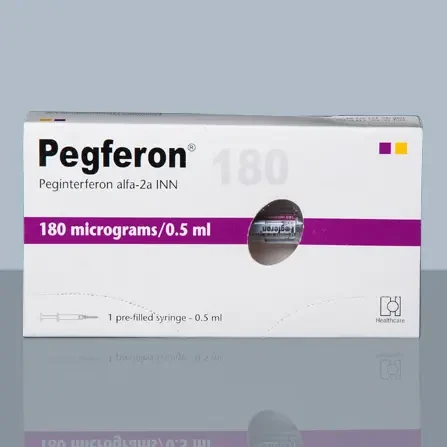Pegferon SC Injection
Pack Image
180 mcg/0.5 ml
0.5 ml pre-filled syringe:
৳ 15,000.00
Indications
Chronic Hepatitis C: Pegferon, alone or in combination with Ribavirin, is indicated for the treatment of aadults with chronic hepatitis C (CHC) virus infection who have compensated liver disease and have not been previously treated with interferon alpha.
Chronic Hepatitis B: Pegferon, is indicated for the treatment of adult patients with HBeAg positive and HBeAg negative chronic hepatitis B infection who have compensated liver disease and evidence of viral replication and liver inflammation.
Chronic Hepatitis B: Pegferon, is indicated for the treatment of adult patients with HBeAg positive and HBeAg negative chronic hepatitis B infection who have compensated liver disease and evidence of viral replication and liver inflammation.
* রেজিস্টার্ড চিকিৎসকের পরামর্শ মোতাবেক ঔষধ সেবন করুন
Pharmacology
Peginterferon alfa-2a, is a covalent conjugate of recombinant alfa-2a interferon with a single branched bis-monomethoxy polyethylene glycol chain. The Peginterferon alfa-2a moiety is linked at a single site to the interferon alfa moiety via a stable amide bond to lysine. Peginterferon alfa-2a has an approximate molecular weight of 60,000 daltons. Interferon alfa-2a is produced using recombinant DNA technology in which a cloned human leukocyte interferon gene is inserted into and expressed in Escherichia coli.
Dosage & Administration
Chronic hepatitis C: The recommended dose of Peg interferon is 180 mcg once weekly for 48 weeks by subcutaneous administration on abdomen or thigh
Chronic hepatitis B: The recommended dose of Peg interferon is 180 mcg once weekly for 48 weeks by subcutaneous administration on abdomen or thigh
Hepatitis C Genotype 1 & 4:
Chronic hepatitis B: The recommended dose of Peg interferon is 180 mcg once weekly for 48 weeks by subcutaneous administration on abdomen or thigh
Hepatitis C Genotype 1 & 4:
- Pegylated Interferon alfa-2a Monotherapy: 180 mcg once weekly for 48 weeks
- Pegylated Interferon alfa-2a dual therapy: 180 mcg once weekly for 48 weeks; Celbarin: <75 kg= (400+0+600) mg, >75 kg= (600+0+600) mg.
- Pegylated Interferon alfa-2a Monotherapy: 180 mcg once weekly for 48 weeks
- Pegylated Interferon alfa-2a dual therapy: 180 mcg once weekly for 24 weeks; Celbarin: (400+0+400) mg.
* রেজিস্টার্ড চিকিৎসকের পরামর্শ মোতাবেক ঔষধ সেবন করুন
Interaction
- Drugs metabolized by CYP1A2: monitor for increased serum levels of theophylline and adjust dose accordingly
- Methadone: monitor for signs and symptoms of methadone toxicity
- Nucleoside analogues: closely monitor for toxicities and dose reduce or discontinue Pegferon alfa 2a/ Ribavirin or both should event worsen
- Zidovudine: monitor for worsening neutropenia and/or anemia with peginterferon alfa/rifavirin
- Azathioprine.
Contraindications
- Hypersensitivity to any component of the product
- Autoimmune hepatitis
- Hepatic decompensation in cirrhotic patients before or during treatment
- Hepatic decompensation with Child-Pugh score greater than or equal to 6 in cirrhotic CHC patients co infected with HIV during or before treatment
- Neonate or infants.
Side Effects
- Depression, suicide, relapse of drug abuse and bacterial infection
- Flu like symptoms: Fatigue, pyrexia,
- Gastrointestinal: Nausea/Vomiting, diarrhea, abdominal pain
- Metabolic and Nutritional: Anorexia
- Musculoskeletal: Myalgia, arthralgia
- Neurological: Headache, dizziness, insomnia
- Psychiatric reactions: Irritability, anxiety
- Injection site reaction, skin problems, hair loss
- Endocrine: Hypothyroidism
Pregnancy & Lactation
Pregnancy Category C: Peginterferon alfa 2a Monotherapy has not been studied for its teratogenic effect. There are no adequate and well-controlled studies of in pregnant women. This is recommended for use in women of childbearing potential only when they are using effective contraception during therapy.
Pregnancy Category X: Use with Ribavirin Significant teratogenic and/or embryocidal effects have been demonstrated in all animal species exposed to ribavirin. Combination therapy is contraindicated in women who are pregnant and in the male partners of women who are pregnant
Nursing Mothers: The effect of orally ingested peginterferon or ribavirin from breast milk on the nursing infant has not been evaluated. Because of the potential for adverse reactions from the drugs in nursing infants, a decision must be made whether to discontinue nursing or discontinue peginterferon and ribavirin treatment.
Pregnancy Category X: Use with Ribavirin Significant teratogenic and/or embryocidal effects have been demonstrated in all animal species exposed to ribavirin. Combination therapy is contraindicated in women who are pregnant and in the male partners of women who are pregnant
Nursing Mothers: The effect of orally ingested peginterferon or ribavirin from breast milk on the nursing infant has not been evaluated. Because of the potential for adverse reactions from the drugs in nursing infants, a decision must be made whether to discontinue nursing or discontinue peginterferon and ribavirin treatment.
Precautions & Warnings
- Patients who have failed alpha interferon treatment with or without ribavirin
- Liver or other organ transplant recipients
- Hepatitis B patients coinfected with HCV or HIV
- Hepatitis C patients coinfected with HBV or coinfected with HIV with a CD4+ cell count < 100 cells/µL
- Caution should be exercised in initiating treatment in any patient with baseline risk of severe anemia
Overdose Effects
There are limited experiences of overdose. There were no serious reactions attributed to overdose. There is no specific antidote. Dialysis is not effective.
Therapeutic Class
Hepatic viral infections (Hepatitis B), Hepatic viral infections (Hepatitis C)
Storage Conditions
Store in refrigerator at 2-8° C; do not freeze or shake. Protect from light.

